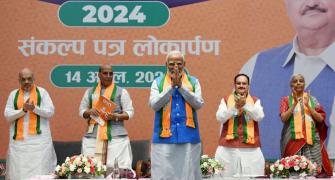 There have been many innovative and helpful developments in the Indian education sector in the last 4-5 years.
There have been many innovative and helpful developments in the Indian education sector in the last 4-5 years. The government has been putting consistent efforts to strengthen the sector as a whole and to improve the quality by private-public partnerships and through IT based education.
In the Union Budget 2011-2012, Finance Minister Pranab Mukherjee allocated Rs 52,057 crore (Rs 520.57 billion) for this sector alone.
A favourable budget allocation is expected this year also as it is very important in meeting the challenges that the sector faces in dealing with raising standards, developing education work force, improving the learning environment and delivering services to the institutions.
This year, members of this sector expect a big push in expenditure especially in connection with the effective implementation of The Right of Children to Free and Compulsory Education Act (RTE Act).
As there are many issues in connection with the RTE Act, like setting up a neighbourhood school in every locality, providing essential infrastructure for the existing and new schools etc, which require a considerable allocation of resources for this sector. This is a major challenge for the government.
Steps have to be taken to increase enrollment rates and reduce dropout rates, reduce gender inequality among girls and to recruit more teachers and train them to impart education more effectively.
The wish-list of the education sector in the upcoming budget includes an accelerated tax break of 150 percent to companies for their investment in education infrastructure. This will definitely call for more investment in education sector.
Many others agree on the need to set up a regulator for quality and compliance in education sector.
Budget is also expected to address rationalisation in higher education regulatory framework through passing key pending legislations like Prohibition of Unfair Practices Bill, Foreign University Bill and Education Tribunals Bill, as well as ensuring a an effective centralised regulator for higher education like the NCHER.
Another major expectation from Union Budget 2012 is the extension of interest subsidy to all courses and more allocation towards interest free education.
The Ministry of Human Resource Development during the 2009-10 fiscal had launched a new scheme to provide full interest subsidy on educational loans for students belonging to families whose annual income is less than Rs.4.5 lakhs under the Educational Loan Scheme of the Indian Bank's Association (IBA).
According to the scheme, a student hailing from a family that has an annual income of less than Rs 4.5 lakh, on procuring income certificate from the concerned local authority, will be required to repay only the principal, and the interest will be borne by the central government.
It was a great initiative to make higher-education loans more attractive to students from financially weaker families. But during the current financial year, many students claimed that the education loan subsidy is still kept under the wraps by most banks.
Banks also indicated that they had several reasons for their caution, like the lack of proper directions from the nodal agencies for processing subsidy claims. There were also a lack of coordination between banks, state governments and HRD ministry and shortage of funds allocated. Many states are still not notified a designate authority for issuing income certificates.
So, greater hopes are there this year to see a better result by more allocation and proper coordination, as India wants to increase its higher education enrollment by nearly 30 million in a decade.
India's education sector at present has a good percentage of private partnership which would help a rapid expansion in the sector.
Still an increased emphasis on public private partnership (PPP) model to compensate the shortfall in existing resources is expected through specific budgetary allocations for publicprivate partnerships and fiscal benefits for PPP projects.
A way to attract private investment in higher education, is to promote Foreign Direct Investment (FDI), by making certain changes in the Foreign Currency Regulation Act (FCRA).
Even though the current law allows 100 per cent FDI in education, for-profit entities are not allowed to get licences from the University Grants Commission and the All India Council for Technical Education (AICTE). They function as private universities under acts of various state governments.
Indian education sector is one of world's largest, comprising 1.3 million schools, 30,000 colleges and 542 universities.
It is estimated that the size of the public education sector in India is $40 billion and the private sector amounted to $60 billion in 2011. So, let's hope the Union Budget 2012-13 would effectively level out some of the key issues pertaining to the education sector.









